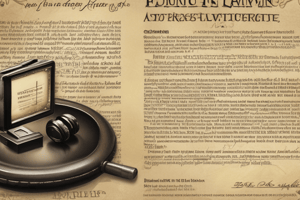Podcast
Questions and Answers
What is the main provision of F.S. §856.021?
What is the main provision of F.S. §856.021?
- It is lawful for any person to loiter or prowl in any place, at any time and in any manner, regardless of the circumstances.
- It is unlawful for any person to loiter or prowl in a place, at a time or in a manner not usual for law-abiding individuals, under circumstances that warrant a justifiable and reasonable alarm or immediate concern for the safety of persons or property in the vicinity. (correct)
- It is lawful for any person to loiter or prowl in a place, at a time or in a manner not usual for law-abiding individuals, under circumstances that do not warrant a justifiable and reasonable alarm or immediate concern for the safety of persons or property in the vicinity.
- It is lawful for any person to loiter or prowl in a place, at a time or in a manner not usual for law-abiding individuals, under circumstances that warrant a justifiable and reasonable alarm or immediate concern for the safety of persons or property in the vicinity.
Which of the following is NOT considered among the circumstances to determine whether alarm or immediate concern is warranted?
Which of the following is NOT considered among the circumstances to determine whether alarm or immediate concern is warranted?
- The person takes flight upon appearance of a law enforcement officer.
- The person refuses to identify himself.
- The person manifestly endeavors to conceal himself or any object.
- The person manifests an obvious intention to comply with law enforcement officers. (correct)
What must a law enforcement officer do before arresting someone for an offense under F.S. §856.021?
What must a law enforcement officer do before arresting someone for an offense under F.S. §856.021?
- Wait for further backup before approaching the person.
- Skip the process and directly arrest the person.
- Request that person to identify himself or herself and explain his or her presence and conduct. (correct)
- Immediately arrest the person without any warning or opportunity to explain.
What must a law enforcement officer provide to the person before affording them an opportunity to dispel any alarm under F.S. §856.021?
What must a law enforcement officer provide to the person before affording them an opportunity to dispel any alarm under F.S. §856.021?
Under what circumstance may a law enforcement officer skip affording the opportunity to dispel any alarm under F.S. §856.021?
Under what circumstance may a law enforcement officer skip affording the opportunity to dispel any alarm under F.S. §856.021?
What is required if a law enforcement officer is unable to afford an opportunity to dispel any alarm under F.S. §856.021?
What is required if a law enforcement officer is unable to afford an opportunity to dispel any alarm under F.S. §856.021?
What is the consequence for violating the provisions of F.S. §856.021?
What is the consequence for violating the provisions of F.S. §856.021?
Under what circumstances can a person not be convicted of an offense under F.S. §856.021?
Under what circumstances can a person not be convicted of an offense under F.S. §856.021?
In which case was it held that there was insufficient reasonable cause for the stop?
In which case was it held that there was insufficient reasonable cause for the stop?
What did the U.S. Supreme Court uphold in Hiibel v. Sixth Jud. Dist. Ct. of Nevada, Humboldt Co.?
What did the U.S. Supreme Court uphold in Hiibel v. Sixth Jud. Dist. Ct. of Nevada, Humboldt Co.?
What is required for all elements of the misdemeanor offense of loitering and prowling to occur in?
What is required for all elements of the misdemeanor offense of loitering and prowling to occur in?
Under what circumstances can an officer arrest a suspected loiterer or prowler without a warrant?
Under what circumstances can an officer arrest a suspected loiterer or prowler without a warrant?
What did the case of G.E.C. v. State establish regarding the arrest for loitering and prowling?
What did the case of G.E.C. v. State establish regarding the arrest for loitering and prowling?
What did the U.S. Supreme Court compare to F.S. §856.021 in Hiibel v. Sixth Jud. Dist. Ct. of Nevada, Humboldt Co.?
What did the U.S. Supreme Court compare to F.S. §856.021 in Hiibel v. Sixth Jud. Dist. Ct. of Nevada, Humboldt Co.?
What conduct led to an arrestee's conduct being deemed insufficient to establish probable cause to arrest for loitering and prowling as defined by F.S. §856.021?
What conduct led to an arrestee's conduct being deemed insufficient to establish probable cause to arrest for loitering and prowling as defined by F.S. §856.021?
In which case was it held that a juvenile's action of pulling on business’s rear door handles at 11:30 p.m. constituted probable cause for arrest?
In which case was it held that a juvenile's action of pulling on business’s rear door handles at 11:30 p.m. constituted probable cause for arrest?
What did Carroll v. State establish regarding the application of F.S. §856.021?
What did Carroll v. State establish regarding the application of F.S. §856.021?
What time did 'M.R.' case involve observing a juvenile at a commercial shopping center pulling on business’s rear door handles?
What time did 'M.R.' case involve observing a juvenile at a commercial shopping center pulling on business’s rear door handles?
Study Notes
F.S.§856.021: Loitering and Prowling
- The main provision of F.S.§856.021 is to regulate loitering and prowling.
- Circumstances to determine whether alarm or immediate concern is warranted do not include mere presence of an individual in a location.
- A law enforcement officer must have probable cause before arresting someone for an offense under F.S.§856.021.
- Before affording an opportunity to dispel any alarm, the officer must provide the person with a reasonable opportunity to explain their presence.
- A law enforcement officer may skip affording the opportunity to dispel any alarm if they believe the person is a threat to themselves or others.
- If a law enforcement officer is unable to afford an opportunity to dispel any alarm, they must document the circumstances.
- Violating the provisions of F.S.§856.021 is a misdemeanor of the first degree.
- A person cannot be convicted of an offense under F.S.§856.021 if they can prove their presence was lawful and not harmful.
Case Law
- In Hiibel v. Sixth Jud. Dist. Ct. of Nevada, Humboldt Co., the U.S. Supreme Court upheld the requirement to identify oneself to law enforcement.
- The U.S. Supreme Court compared the "stop and identify" statute to F.S.§856.021 in Hiibel v. Sixth Jud. Dist. Ct. of Nevada, Humboldt Co.
- The case of G.E.C. v. State established that the arrest for loitering and prowling must be based on probable cause.
- In Carroll v. State, it was established that F.S.§856.021 can be applied if a person's actions are deemed suspicious.
Probable Cause
- Probable cause for arrest requires that all elements of the misdemeanor offense of loitering and prowling occur in a specific location.
- An officer can arrest a suspected loiterer or prowler without a warrant if they have probable cause.
- In the case of M.R., pulling on business's rear door handles at 11:30 p.m. was deemed sufficient to establish probable cause for arrest.
- In contrast, in another case, pulling on business's rear door handles at 11:30 p.m. was deemed insufficient to establish probable cause for arrest.
Studying That Suits You
Use AI to generate personalized quizzes and flashcards to suit your learning preferences.
Description
Test your knowledge of Florida Statute §856.021, which prohibits loitering or prowling in a manner that causes immediate concern for safety or property. Questions may cover circumstances that could justify alarm, such as fleeing when law enforcement appears.




